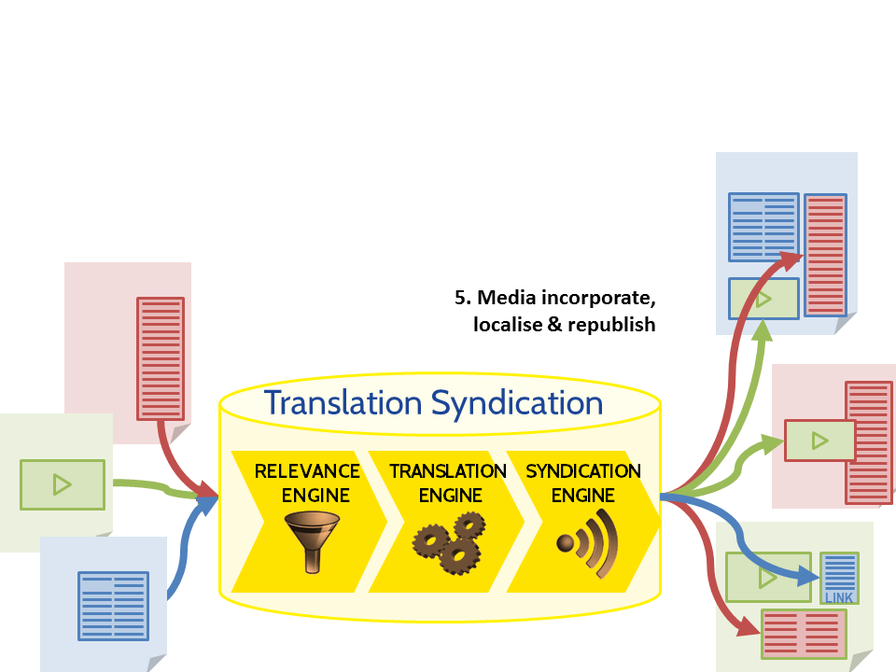Exploring Translated Syndication at Future Media Lab 2016

Imported from the Blogactiv.eu blogging platform, closed without warning in 2021. Links, images and embeds not guaranteed, and comments not displayed.
The afternoon session at Future Media Lab 2016 showed that while European media are warming to the idea of using advanced language technologies to share content across borders, their audiences are already well ahead of them.
This is a repost from the Future Media Lab blog (and so matches its dryness) and covers a workshop led by a client.
The conference session explored the “Translation Syndication” concept, where media in different countries exchange, translate, localise and republish each other’s content, increasing both volume and depth of coverage cost-effectively. To media outsiders, this sounds like a no-brainer: today’s media is in crisis, and media working in different languages are not competitors, so why on Earth would they not exchange content and mutually boost their revenues?
The reality, of course, is far more complex. The few experiments to date, such as the (website-free) Leading European Newspaper Alliance and the (temporary) Climate Publisher’s Network, have been extremely lo-tech and exploratory.
Media trailing their own audience
But data presented by Christophe Leclercq as he opened the session suggests that European audiences would like more:
64% of the respondents to EurActiv’s recent Readership Survey (1790 responses, December 2015-January 2016) would like to see more translated articles from national media sources.
But what, exactly, do we mean by translated articles? The survey showed that although 60% use Google Translate at work, under 20% are satisfied with machine translation only, even if it does give them an immediate result:
Almost 60% would prefer machine translation improved by a human being within ‘same day’ or ‘half day’ timescales.
Enter Translated Syndication
The basic idea behind Translated Syndication was then set out to the session participants, who then split into tables to workshop answers to three questions: how could it help their competitiveness; what are the obstacles; and what should institutions like the EU and media associations do to help?
The resulting process can be summarised as follows:
1. Media in the Translated Syndication Platform share content to it direct from their CMS
2. Each article is automatically categorised by a ‘Relevance Engine’ …
3.… before being auto-translated and summarised.
4. As journalists in other media in the Platform prepare their articles, their CMS automatically presents a feed of relevant articles from across Europe, auto-translated and ready to use
5. They correct, localise and otherwise incorporate this content into their own publication, deepening their coverage and/or increasing their output.
The resulting discussion was a good example of how a group can refine and develop an idea – the ‘Relevance Engine’ in Step 2, for example, emerged from two workshop tables, as did a wider spectrum of uses for the syndicated content, from simply sharing ‘journalistic research’ through to localising and republishing articles.
Building trust is key
Inevitably, trust emerged as a key issue: participating media will need to be sure that the content they are re-using comes from quality sources, particularly as the Platform may remove the articles’ surrounding context. Apart from applying appropriate Membership requirements, more than one participant suggested building a lightweight social network into the Platform, allowing journalists to message an article’s author to get the necessary background. As an added benefit, such a network would stimulate journalistic and commercial collaboration across Europe.
“such a network would stimulate deeper journalistic collaboration across Europe”
Similarly, trusting that the Platform handles copyright management would be crucial, particularly with so many freelancers working in media. Blockchains were floated as a possible solution here. Despite these reservations, each workshop table was clear that such a Platform would definitely improve their media’s competitiveness, and - unsurprisingly - called upon the EU to boost research funding in the field.
Further reading
- Applying advanced language technologies to EU democracy
- 21 posts tagged media here, and another 230+ useful resources tagged media on my Hub
Related reading
More Stuff I Think
More Stuff tagged media , syndicated-translation , multilingualism , publicsphere , machine translation , euractiv
See also: Communication Strategy , Content Strategy , Online Community Management , Media , Politics , Communications Strategy , Science&Technology